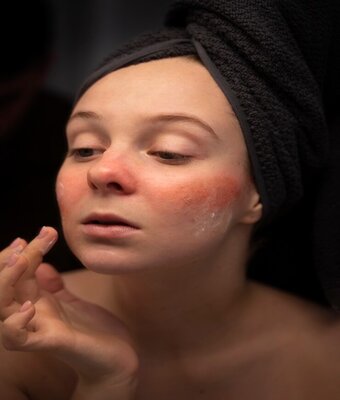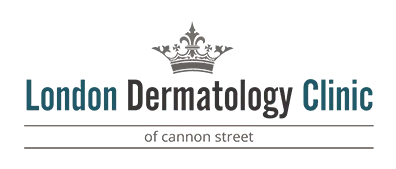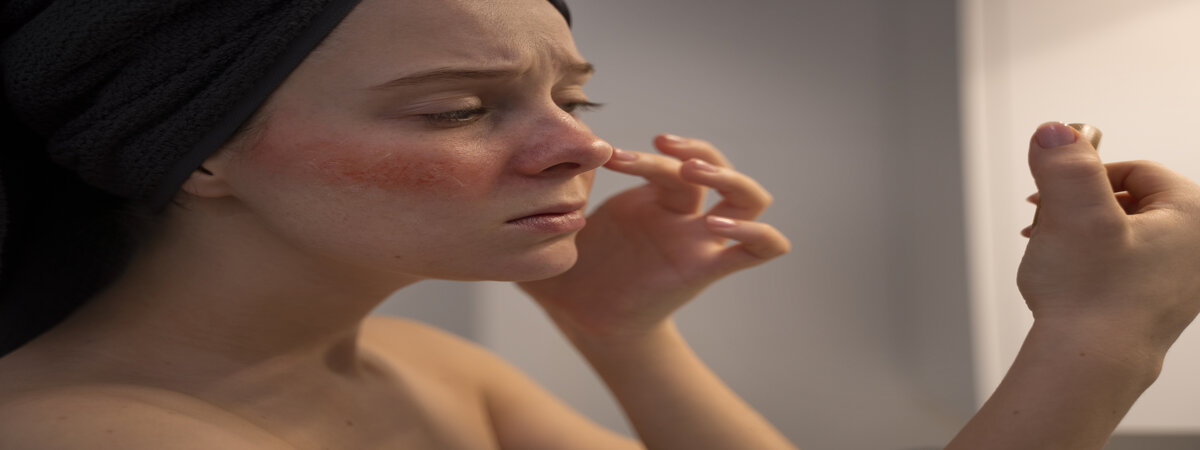
Understanding Rosacea: More Than Just Redness
If your face often feels hot, red, or sensitive—and those flare-ups seem to come out of nowhere—you might be dealing with rosacea. It’s more common than you’d think, and it’s something we see (and treat) all the time.
Rosacea isn’t just about flushing. It can cause breakouts, visible blood vessels, and even stinging or burning. Some people notice their nose getting redder or slightly swollen. For others, their eyes start to feel irritated—dry, watery, or just uncomfortable.
It can be a lot to manage. But here’s the truth: you’re not alone, and it can get better with the right treatment.
What Rosacea Looks Like
There’s no one way rosacea shows up—but here are some of the most common signs:
Redness that sticks around longer than usual
Skin that flushes easily
Bumps that look like acne but don’t go away with acne treatments
Small, visible blood vessels
A burning or stinging feeling on the cheeks or nose
In some cases, eye issues or swelling around the nose
Rosacea tends to show up between the ages of 30 and 50, and we often see it more in people with fair skin. Women are slightly more likely to have it—but men can experience it too, often with more severe symptoms.
What Causes Rosacea?
There’s no single cause, and it’s not something you’ve done wrong. Genetics can play a role. So can things like:
-
Heat or sun exposure
-
Stress
-
Spicy foods or alcohol
-
Certain skincare or makeup products
-
Even hot drinks like tea or coffee
Everyone’s triggers are different. One of the most helpful things we can do is help you figure out what yours are and how to avoid them—without feeling like you need to change your whole life.
What We Can Do to Help
There’s no cure for rosacea, but that doesn’t mean you’re stuck with it. We’ve helped a lot of people calm their skin and feel more comfortable in it again. Here’s what rosacea treatment might look like:
Prescription creams or gels – These can help bring down inflammation and soothe irritated skin.
Oral antibiotics – If the bumps or swelling are more intense, a short course of antibiotics can help.
Laser treatment – If you’re bothered by redness or visible vessels, laser therapy can fade them gradually.
Skincare support – Sometimes, just switching to the right gentle products makes a huge difference. We’ll walk you through what to use—and what to avoid.
Ongoing support – We know flare-ups can come and go. We’re here for the long run, not just a quick fix.
Why Early Treatment Matters
Rosacea can slowly get worse if it’s not treated, especially if flare-ups are frequent. But early care can help keep things under control and even prevent symptoms from progressing.
And honestly? Treating rosacea isn’t just about skin—it’s about confidence. We’ve had patients tell us they stopped going out or wearing makeup because they didn’t know what was going on. That changes once they feel like they’re getting real answers and real help.
What to Do Next
If this sounds like what you’re going through, come talk to us. No pressure, no judgment. Just a conversation to figure out what’s going on with your skin and what can be done to help.
We offer consultations at our London clinic, and our dermatologists have a lot of experience treating rosacea—mild to severe. You’ll get honest advice and a treatment plan that makes sense for you.
FAQ
Is rosacea treatment suitable for all skin types and tones?
Yes, rosacea treatment options can be tailored to accommodate various skin types and tones. Our dermatologists will assess your unique skin characteristics and customize a treatment plan accordingly.
Are there any side effects associated with rosacea treatments?
While rosacea treatments are generally safe, some individuals may experience temporary side effects such as mild redness, dryness, or a tingling sensation at the treatment site. These effects are typically short-lived and can be discussed with your dermatologist.
How long does it take to see results from rosacea treatment?
The timeline for seeing results can vary depending on the specific treatment used and the severity of your rosacea. Some patients may notice improvement within a few weeks, while others may require more time. Your dermatologist will provide guidance on what to expect.
Can rosacea be completely cured with treatment?
Rosacea is a chronic condition, and while treatments can effectively manage its symptoms, it may not be completely cured. However, with proper care and ongoing management, most individuals can achieve significant improvement in their skin’s appearance and overall comfort.
Do I need to avoid certain foods or activities during rosacea treatment?
Your dermatologist may recommend avoiding certain triggers known to exacerbate rosacea symptoms, such as spicy foods, alcohol, and excessive sun exposure. However, specific dietary and lifestyle recommendations will depend on your unique case.
Is it possible for rosacea to worsen over time despite treatment?
In some cases, rosacea may progress despite treatment. This emphasizes the importance of regular follow-up appointments with your dermatologist to adjust your treatment plan as needed and to monitor any changes in your condition.


